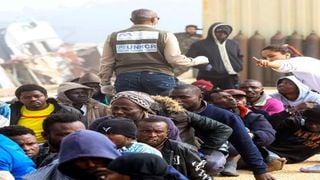
Workers from the office of the United Nations High Commissioner for Refugees tend to African migrants rescued from a ship off the coast of Zawiyah, about 45 kilometres west of the Libyan capital Tripoli, as they sit at the dock at the capital's naval base on March 10, 2018.
| Mahmud Turkia | AFPAfrica
Premium
Irony of sick Libya hosting thousands of refugees, in detention centres
Libyan authorities are holding thousands of refugees in detention centres though the country itself is falling apart due to violence, partly a result of disagreements even at the UN Security Council.
Ayman Gharaibeh, the head of the UN Refugee Agency (UHCR) for the Middle East and North Africa, is warning that the humanitarian situation for asylum seekers and refugees in Libya could add to the crisis already worsened by the ongoing conflict.
It started last week after authorities rounded up refugees in chaotic scenes where the UNHCR says one person died and more than a dozen others were injured.
“More than 5,000 people have now been arrested and held in several detention centres in overcrowded and unsanitary conditions,” Gharaibeh said in a statement earlier this week.
“Among those are several who had been prioritised for evacuation or resettlement flights out of Libya.” Libyan authorities have, for the last year, shut out humanitarian flights that often helped reduce the crowding by resettling asylum seekers elsewhere.
His statement came as the UN Security Council struggles to adopt a common position on the future of the UN Stabilisation Mission in Libya (UNSMIL), whose mandate expires in January next year.
For Libya, the idea of hosting refugees while also struggling to make peace with its own people may be ironic. But the protracted conflict since 2011 after the 2010 toppling and killing of Muammar Gaddafi made the country a viable ‘gateway’ to Europe for those fleeing Africa’s troubles.
Illegal routes
According to an assessment by the International Organisation for Migration (IOM), the lawlessness created by different fighting factions has also enabled illegal routes for migrants. Recently, though, the country’s nascent authorities have been rounding up those arrested at sea and returning them to detention centres. A bulletin by the medical charity group MSF said last week those centres are overcrowded.
Yet the country itself is run by different factions, one endorsed by the UN and the other opposed but carrying significant influence. The IOM says these factions mean no authority can provide for the estimated three million displaced people in Libya, besides the crowded detention centres.
This year alone, the International Rescue Committee said some 23,000 people, including 1,000 children, trying to flee to Europe from other parts of Africa were intercepted at sea by the Libyan Coast Guard between January and August.
“Almost all survivors were sent to Libya’s notorious detention centres, where exploitation, abuse and multiple other violations of their human rights take place on a regular basis,” IRC said in a statement. “We're calling for their immediate release.”
Once a regional powerhouse fuelled by petrodollars, Libya became a victim of the Arab Spring, a chain of civil protests that began in Tunisia before spreading across most of North Africa and the Middle East from 2010.
Today, its economy has mostly collapsed out of political instability. The UN has endorsed a political calendar for elections on December 24, but the UN Security Council has failed to agree on the future of the UNSMIL, as well as to convince rebel groups that are yet to agree on elections.
On September 30, the Council extended the mandate of UNSMIL temporarily until January 31 as an integrated special political mission, following the previously agreed 15-day technical rollover.
The Council said that the fighting parties should enter a full ceasefire that “must include the withdrawal of all foreign forces and mercenaries”. But members of the 15-member body, including Kenya, have disagreed on whether to implement the recommendations of a technical team drafted to review the mandate of UNSMIL.
Special envoy
One contentious issue has been whether to continue using a special envoy based in Geneva or appoint a head of mission based in Tripoli for effective management on the ground.
Kenya’s permanent representative to the UN, Dr Martin Kimani, argued that an effective UNSMIL could handle some of the crises in the country, helping to stabilise Libya.
But by haggling over its future structure, he warned, the UN “had missed the opportunity for the inclusion of important elements for Libya’s national reconciliation efforts and issues of interest to the neighbouring states”.
“We must listen to Libya…. the UN Security Council must walk the talk of inclusion,” he said, calling for more roles for Africans, especially those neighbouring Libya.
African countries on the UN Security Council had issued a joint statement earlier, calling for the removal of foreign fighters in Libya and that “regional and international attention be paid to the need for disarmament, demobilisation and reintegration”.
“In this regard, we urge that the impending UNSMIL mandate renewal acknowledges this, to help prevent the possible cyclic conflict in the Sahel region and beyond,” said Kenya, Tunisia, Niger and the St Vincent and Grenadines, jointly known as A3+1.
On Monday, UN Secretary-General Antonio Guterres endorsed an agreement by military chiefs (known as 5+5 Joint Military Commission) from the two main rival factions in Libya for an ‘Action Plan’ that describes a “gradual, balanced and sequence process” of withdrawal by foreign fighters and mercenaries.
This was a crucial first step in implementing an October 2020 ceasefire agreement between the Government of National Unity (GNA) and the Libyan National Army led by Khalifa Haftar.
“The Secretary-General applauds the unity of purpose prevailing within the 5+5 JMC and calls on all Libyan and international actors to work towards the implementation of this Action Plan,” Guterres spokesperson Stéphane Dujarric said on Monday.





